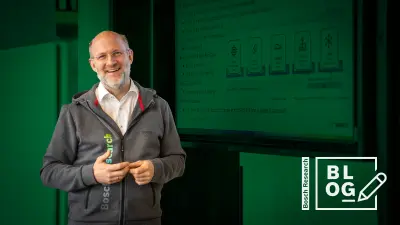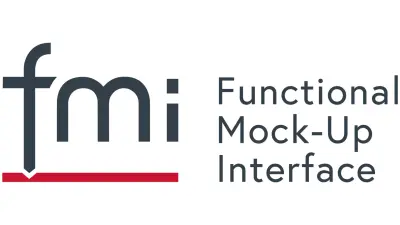FMI 3.0 – The next generation exchange format for system simulation beyond tool borders
Bosch Research Blog | Posted by Christian Bertsch, 2022-06-09

What would you do if your electric plugs at your home did not fit into the sockets of your home, but instead you needed 100 different ones?
At least within a country, this is solved by standards prescribing the format of plugs and sockets, even though international travelers still face this problem. For simulation models, there is no legislation to enforce the compatibility of the interfaces between different simulation models, so industry has solved this problem on its own – with the creation of the Functional Mock-Up Interface (FMI).
For many years, product modeling and simulation have established themselves as core elements of product engineering for advanced components and complex systems. Therefore, we use many specialized simulation tools, and it is a hard task to exchange models between different departments and partners. In order to reach optimal system behavior, it is essential to create overarching simulation models consisting of combined models of the different components and subsystems. But how can we reach this with more than 100 different simulation tools, as is the case at Bosch?
Before FMI – linguistic babel in the simulation world
The tool landscape in the simulation world is very heterogeneous. Within Bosch, we use more than 100 different simulation tools that have their strengths in different physical or technical domains, in different levels of abstraction and, for example, in the capabilities for where to execute or deploy the models. Each of these tools has a different approach to creating and representing the models (e.g. with dedicated modeling languages, graphical modelling, model libraries). In today’s increasingly virtualized product development, the requirement is that you can optimize the overall system behavior. For this, simulation models must be exchanged between different departments. However, before FMI there was no tool-independent format to exchange models between the different simulation tools.
The FMI approach
This triggered the development of FMI in the publicly funded MODELISAR project from 2008 to 2011. Since then, FMI has been a home run in establishing itself as the de facto industry standard for model exchange and co-simulation on the system level and is supported by more than 170 different simulation tools.
FMI 3.0: addressing important challenges for the BOSCH Group
One of the big success factors of FMI has been its stability – the last major release came in 2014, and tool vendors supporting FMI did not have to update their tools very often. Since then, however, many needs have accumulated, especially for new usage domains such as virtual electronic control units (vECUs), advanced co-simulation with mixed discrete and continuous behavior and new demands to encapsulate and efficiently train artificial intelligence (AI) models, or usage of FMI on new platforms such as cloud simulation.
On May 10, 2022, eight years after the release of FMI 2.0, version 3.0 of the FMI standard was released! This is a major step forward, as this resolved the previous shortcomings and enables totally new use cases. We see major advances in how to treat time-discrete behavior and different data types. This, for example, will allow for the much better and efficient creation of virtual electronic control units (vECUs) for software-in-the-loop simulation. The new binary data type will allow for the simulation of complex sensor systems and video signals that are necessary for the simulation of automated driver assistance functions (ADAS).
Bosch Research’s contribution and benefit
In the first years of FMI adoption, Bosch Research contributed to the maturity of the FMI standard and its implementations by proposing and contributing to quality measures such as the FMI cross-check and an FMI compliance checker tool.
The FMI project is international, and the development of the standard took place in FMI Design Meetings, several of which were hosted by Bosch at its Research Campus Renningen.
Bosch Research has compiled the needs of the different Bosch business units and subsidiaries with respect to needed extensions to FMI and actively contributed to bringing them into version 3.0 of the standard text.
Bosch Research has also initiated additional research activities such as the EMPHYSIS project to extend FMI toward usage in embedded systems.

Summary
The Functional Mock-Up Interface (FMI) is a tool-independent open standard for exchanging and co-simulating simulation models created in different simulation tools. Such models can describe the dynamic behavior of a component (e.g. an electrical machine) or a system (e.g. a battery-electric vehicle) consisting of many components and subsystems – and they can be used for virtualized design and testing. FMI is heavily used within Bosch and in collaboration with partners. We at Bosch Research actively contribute to the development of the standard and make sure that it fits our future needs in the field of autonomous driving and electrification. In particular, we make sure that it can be efficiently used for both physics- and data-based models, hybrid models (combinations of the former) and software (e.g. in the form of virtual electronic control units (vECUs)). The Functional Mock-Up Interface (FMI) has recently been released as a new 3.0 version. This is a big step toward interoperability in system modeling and simulation.
What are your thoughts on this topic?
Please feel free to share them or to contact me directly.

Author: Christian Bertsch
Christian Bertsch is a senior project manager at Bosch Research.
He studied mathematics and physics at the University of Heidelberg, Germany with a focus on numerics. 2001 he joined Bosch as a simlation engineer and since 2004 works at Bosch Corporate Research leading projects in the field of system simulation, advanced model-based functions and algorithms for embedded software and the cloud and dynamical digital twins.
Additionally he coordinates the usage of FMI within the Bosch Group, and represents Bosch in the Steering Commnittee of the Modelica Association project FMI. There he actively contributes the the FMI standard and rececently has been elected as project leader of the FMI project.
